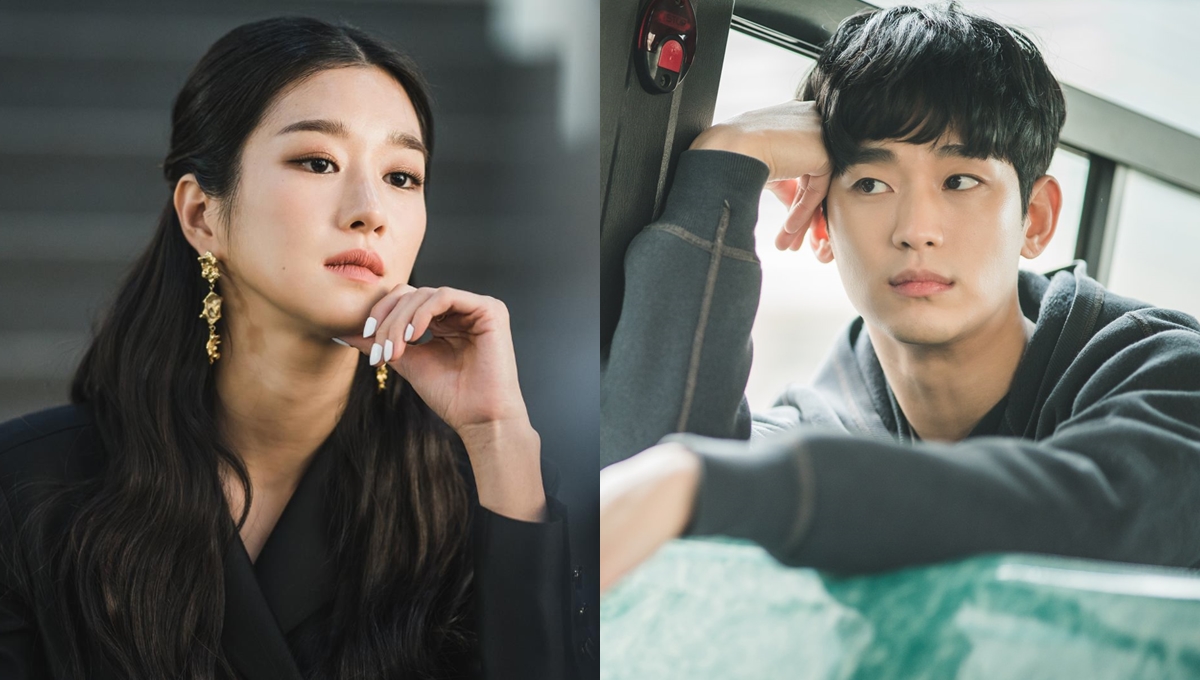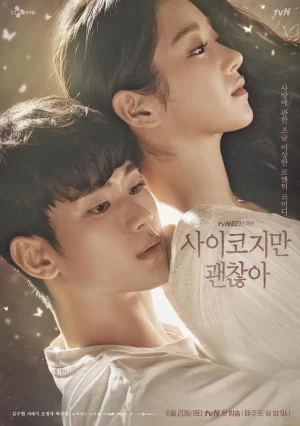It s Okay to Not be Okay (2020) เรื่องหัวใจ ไม่ไหวอย่าฝืน เจ้าหน้าที่ดูแลผู้ป่วยจิตเวชที่อุทิศตัวเพื่อผู้อื่นโคจรมาพบกับนักเขียนนิทานเด็กต่อต้านสังคมบนเส้นทางแห่งการเยียวยาจิตใจที่แสนพิเศษ

It s Okay to Not be Okay (2020)
ภายใต้อ้อมกอดอันอ่อนโยนของความเปราะบางและการเยียวยา “It’s OK to Not be OK” จะค่อยๆ คลี่คลายเรื่องราวอันฉุนเฉียวที่สะท้อนอย่างลึกซึ้งกับผู้ชม ซีรีส์ดราม่าเกาหลีใต้ที่ออกฉายในปี 2020 กำกับโดยพัคชินวู นำเสนอการสำรวจอย่างลึกซึ้งเกี่ยวกับสุขภาพจิต ความบอบช้ำทางจิตใจ และพลังการเปลี่ยนแปลงของความรักและการยอมรับ
โดยแก่นของซีรีส์นี้เกี่ยวกับชีวิตของ Moon Gang-tae ผู้ดูแลจิตเวชที่ถ่ายทอดอารมณ์โดย Kim Soo-hyun และ Ko Moon-young ผู้เขียนหนังสือเด็กที่มีอดีตที่มีปัญหา นำมาสู่ชีวิตโดย Seo Ye- จิ. ชีวิตของพวกเขามาบรรจบกันด้วยวิธีที่ไม่คาดคิด นำไปสู่การเดินทางของการค้นพบตัวเองและการเยียวยาที่เข้าถึงใจผู้ชมทั่วโลก It s Okay to Not be Okay (2020)
การแสดงภาพของคังแทของคิมซูฮยอนนั้นทั้งละเอียดอ่อนและจริงใจ โดยคำนึงถึงความรับผิดชอบของเขาในฐานะผู้ดูแล ในขณะเดียวกันก็ถ่ายทอดความสับสนวุ่นวายทางอารมณ์ที่คุกรุ่นอยู่ใต้ผิวเผิน การเดินทางของ Gang-tae ไปสู่การยอมรับความเจ็บปวดของตัวเองและการเรียนรู้ที่จะยอมรับความอ่อนแอเป็นธีมหลักของซีรีส์นี้ และ Kim ก็นำเสนอการแสดงที่น่าดึงดูดพอ ๆ กับที่เคลื่อนไหว
ฝั่งตรงข้ามของเขา ซอเยจิเปล่งประกายในฐานะมุนยังผู้ลึกลับและซับซ้อน ซึ่งภายนอกของเขาเยือกเย็นปฏิเสธความปรารถนาที่ฝังลึกในการเชื่อมโยงและความเข้าใจ เยจินำการแสดงที่ดึงดูดใจมาสู่จอภาพยนตร์ โดยทำให้มุนยังมีความอ่อนแอและความแข็งแกร่งพอๆ กัน ในขณะที่เธอสำรวจบาดแผลในอดีตของเธอและเรียนรู้ที่จะเปิดใจรับความรัก kubhd
ผู้กำกับพัคชินวูนำทางความสมดุลอันละเอียดอ่อนระหว่างแสงสว่างและความมืดได้อย่างเชี่ยวชาญ โดยผสมผสานซีรีส์นี้เข้ากับช่วงเวลาแห่งความอบอุ่น อารมณ์ขัน และความอ่อนโยน ท่ามกลางธีมที่หนักหน่วงของบาดแผลทางจิตใจและความเจ็บป่วยทางจิต ตั้งแต่ภาพประกอบในเทพนิยายสุดแปลกที่มีชีวิตขึ้นมาไปจนถึงภาพยนตร์ที่สวยงามชวนขนลุก ทุกแง่มุมของซีรีส์นี้ได้รับการสร้างสรรค์ขึ้นด้วยความใส่ใจในรายละเอียดอย่างพิถีพิถัน ดึงดูดผู้ชมเข้าสู่โลกที่น่าหลงใหลพอ ๆ กับที่สะท้อนอารมณ์ It s Okay to Not be Okay (2020)

แต่บางทีแง่มุมที่ทรงพลังที่สุดของ “It’s OK to Not be OK” ก็คือการนำเสนอปัญหาสุขภาพจิตอย่างไม่ท้อถอยและความสำคัญของการขอความช่วยเหลือและการสนับสนุน ตลอดทั้งซีรีส์ พัคชินวูจะจัดการกับหัวข้อต้องห้าม เช่น ความซึมเศร้า ความวิตกกังวล และความบอบช้ำทางจิตใจ ด้วยความอ่อนไหวและความเห็นอกเห็นใจ โดยฉายแสงให้กับการต่อสู้ดิ้นรนที่ต้องเผชิญกับความเจ็บป่วยทางจิต
สนับสนุนการแสดงจากนักแสดงทั้งมวล รวมถึงโอจุงเซรับบทเป็นพี่ชายของคังแท และพัคกยูยังในฐานะพยาบาลที่มีความเห็นอกเห็นใจ ช่วยเพิ่มความลึกและความสมบูรณ์ให้กับเรื่องราว โดยเน้นย้ำข้อความที่ว่าการเยียวยาเกิดขึ้นได้เมื่อเราเรียนรู้ที่จะพึ่งพา ซึ่งกันและกัน.
ในท้ายที่สุด “It’s OK to Not be OK” เป็นมากกว่าซีรีส์ทางโทรทัศน์ มันเป็นเครื่องเตือนใจที่ทรงพลังว่าการรู้สึกอ่อนแอนั้นเป็นเรื่องปกติ และการขอความช่วยเหลือเป็นสัญญาณของความเข้มแข็ง ไม่ใช่ความอ่อนแอ ด้วยการเล่าเรื่องที่สะเทือนอารมณ์ การแสดงอันน่าหลงใหล และข้อความแห่งความหวังจากใจจริง ซีรีส์เรื่องนี้ทิ้งร่องรอยไว้ในใจของผู้ชมอย่างไม่มีวันลบเลือน ย้ำเตือนเราทุกคนว่าเราคู่ควรกับความรักและการยอมรับ ไม่ว่าเราจะดิ้นรนดิ้นรนเพียงใด
ด้วยธีมที่ทรงพลัง ตัวละครที่น่าดึงดูด และภาพที่สวยงาม ทำให้ “It’s OK to Not be OK” ถือเป็นเครื่องพิสูจน์ถึงพลังแห่งการเยียวยาของความเห็นอกเห็นใจและความสัมพันธ์ ดังนั้นหยิบกล่องทิชชู่ เข้ามาชมเซสชั่นการชมแบบมาราธอน และเตรียมพร้อมที่จะสัมผัสด้วยเรื่องราวสุดพิเศษแห่งความรัก การเยียวยา และการค้นพบตัวเอง
It s Okay to Not be Okay (2020) เรื่องหัวใจ ไม่ไหวอย่าฝืน
In the tender embrace of vulnerability and healing, “It’s Okay to Not be Okay” gently unfolds a poignant narrative that resonates deeply with viewers. Released in 2020, this South Korean drama series, directed by Park Shin-woo, offers a profound exploration of mental health, trauma, and the transformative power of love and acceptance.
At its core, the series revolves around the lives of Moon Gang-tae, a psychiatric caregiver portrayed with emotional depth by Kim Soo-hyun, and Ko Moon-young, a children’s book author with a troubled past brought to life by Seo Ye-ji. Their lives intersect in unexpected ways, leading to a journey of self-discovery and healing that touches the hearts of audiences worldwide.
Kim Soo-hyun’s portrayal of Gang-tae is both nuanced and heartfelt, capturing the weight of his responsibilities as a caregiver while also conveying the emotional turmoil simmering beneath the surface. Gang-tae’s journey towards acknowledging his own pain and learning to embrace vulnerability is a central theme of the series, and Kim delivers a performance that is as compelling as it is moving.
Opposite him, Seo Ye-ji shines as the enigmatic and complex Moon-young, whose icy exterior belies a deep-seated longing for connection and understanding. Ye-ji brings a magnetic presence to the screen, infusing Moon-young with equal parts vulnerability and strength as she navigates the scars of her past and learns to open her heart to love.
Director Park Shin-woo masterfully navigates the delicate balance between light and dark, infusing the series with moments of warmth, humor, and tenderness amidst the heavier themes of trauma and mental illness. From the whimsical fairy tale illustrations that come to life to the hauntingly beautiful cinematography, every aspect of the series is crafted with meticulous attention to detail, drawing viewers into a world that is as enchanting as it is emotionally resonant.

But perhaps the most powerful aspect of “It’s Okay to Not be Okay” is its unflinching portrayal of mental health issues and the importance of seeking help and support. Throughout the series, Park Shin-woo tackles taboo topics such as depression, anxiety, and trauma with sensitivity and compassion, shining a light on the struggles faced by those living with mental illness.
Supporting performances from an ensemble cast, including Oh Jung-se as Gang-tae’s older brother and Park Gyu-young as a compassionate nurse, add depth and richness to the story, further emphasizing the message that healing is possible when we learn to lean on one another.
In the end, “It’s Okay to Not be Okay” is more than just a television series; it’s a powerful reminder that it’s okay to feel vulnerable and that seeking help is a sign of strength, not weakness. Through its poignant storytelling, captivating performances, and heartfelt message of hope, the series leaves an indelible mark on the hearts of viewers, reminding us all that we are worthy of love and acceptance, no matter our struggles.
With its powerful themes, compelling characters, and stunning visuals, “It’s Okay to Not be Okay” stands as a testament to the healing power of empathy and connection. So grab a box of tissues, settle in for a marathon viewing session, and prepare to be moved by this extraordinary tale of love, healing, and self-discovery.



































2.4